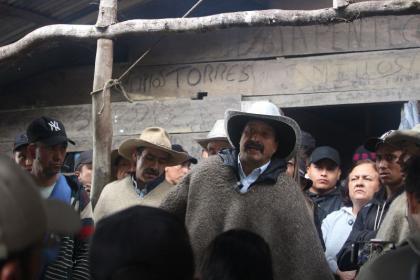The humanitarian caravan that traveled through the municipalities of Socha, Socotá, Pisba, and Paya in the department of Boyacá ended with a unanimous call: communities, along with social, peasant, human rights organizations, and the media, urgently demand the construction of a road that will improve their living conditions.
On September 28, in the community of El Santuario (Socotá), a roundtable for consultation and negotiation was set up between the Corredor Humanitario Ruta Libertadora Association and state institutions. Its objective is to get the Colombian state to respond to a long-standing demand of the communities: the construction of 32 kilometers of road that would transform the quality of life of their inhabitants.
Participants in the Caravan, which took place from September 26th to 28th, were able to confirm the repeated complaints of the community.
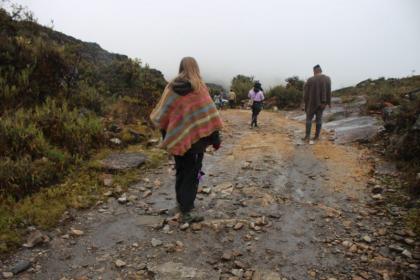
The urgency of building a road
Social organizations, media, human rights defenders, and government representatives were able to document the difficult conditions faced by communities due to state neglect, economic insecurity, environmental degradation, and the ongoing violation of their rights.
Peasant senator Robert Daza, Presidential Advisor for the Regions Luz María Múnera, and representative of the Governor of Boyacá Nini Johana Moreno participated in the discussion. The Defensoría del Pueblo [Ombudsman Office] attended only the first day and, without explanation, left the event.
Luz María Múnera committed to promoting actions to advance the construction of the road. Senator Daza and other national officials took the same stance and recognized the urgency of the work. For her part, Nini Johana Moreno committed to presenting the community's demands to Governor Carlos Amaya.
The communities hope that, in the coming days, state entities will take concrete measures regarding the requested road.
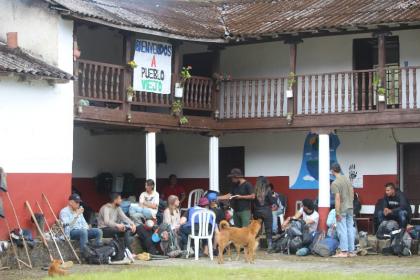
Mayors disconnected from communities
Representatives from the town halls of Socha, Socotá, Pisba, and Paya did not attend the closing ceremony, despite having been invited and informed several weeks in advance.
One of the most criticized cases was that of the mayor of Socotá, Adiel Panqueba Chía, who openly stigmatized communities and social organizations, insinuating links with armed groups and claiming that the caravan “was there for tourism.” This, despite the fact that the main demand is the construction of the road.
Farmers in the region said that during the last political campaign, Panqueba had promised to support the construction of the road, a promise he did not keep. Although the community organized raffles and fundraising events to raise money, the mayor threatened to send the police if they began work on the road.
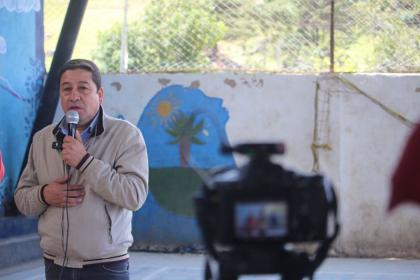
On September 26th, the mayor denied having any knowledge of the caravan, even though his administration, like the other entities, had been informed of it several weeks earlier. He did not attend the roundtable discussion on September 28th.
In response to this situation, one of the human rights defenders present filed a complaint with the representative of the department of Boyacá, in hope that the stigmatizing statements made by Mayor Panqueba and other local officials will be investigated.
In response to the environmental arguments put forward by some opponents of the road, the peasant communities pointed out that they had always protected the Pisba páramo and that it was possible to build a road with minimal impact on the environment.
They also pointed out ironically that if the region contained oil or other valuable resources, the road would already have been built. They therefore doubt that the institutions' real concern is the environment.
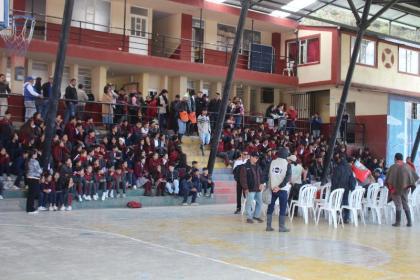
Rights denied
Colombia Informa accompanied the caravan and witnessed firsthand the communities' longstanding demands. Although this region is part of the Ruta Libertadora, crossed more than 200 years ago by Simón Bolívar's army, its inhabitants still have no roads and must travel for hours on foot or by mule or horse.
The population denounced the fact that, on several occasions, sick people have died on the way, unable to reach the hospital in time. Although the communities improvise stretchers and join forces to transport their relatives or neighbors, the journey through the cold Pisba páramo is long and dangerous.
Transporting a loved one can take eight to ten hours on foot only to reach a vehicle and then travel to the distant hospitals of Boyacá.
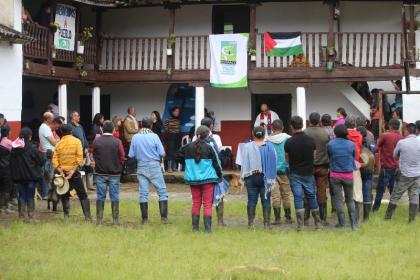
Other rights not respected
The lack of roads also prevents the peasants from selling their products, such as coffee, bananas, potatoes, and meat. Many residents are leaving the region due to the lack of jobs, of education, and the inability to sell their crops, not to mention the difficulties in improving their homes, as they cannot transport building materials.
Added to this is the lack of electricity, internet, telephone, and water and sewer services, which are essential for a dignified life, and to which the communities still have no access.
With the end of the Caravan and the establishment of a Consultation Table, the communities are hopeful that the national government, the departmental government, and the relevant entities will keep their promise to build the 32 kilometers of road that have the potential to change the lives of farming families in this region of Boyacá.
